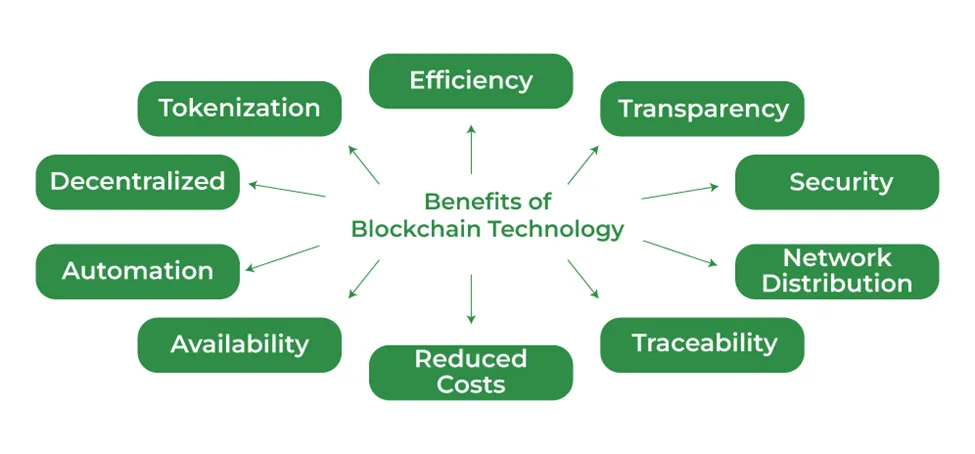In today’s rapidly evolving business landscape, blockchain technology has emerged as a powerful tool, transforming industries by offering greater transparency and security. From supply chain management to financial transactions, blockchain technology for business ensures that information is accurate, secure, and accessible to all parties involved. This article delves into the critical role of blockchain in enhancing both transparency and security, exploring its applications, benefits, and future potential.
Blockchain in Business
Blockchain in Business is a decentralized ledger that securely records transactions across multiple systems. Each entry is immutable, meaning once data is recorded, it cannot be altered, ensuring that all business dealings are accurate and reliable. The technology allows companies to improve operations, reduce fraud, and increase trust between partners and consumers.
In the business world, the demand for transparency and security is growing, and blockchain technology is uniquely positioned to meet these needs. The decentralized nature of blockchain creates a transparent environment, where all stakeholders can view transaction histories, providing a level of visibility that traditional systems lack.

The Role of Blockchain in Enhancing Business Transparency
Blockchain Transparency is transforming industries by allowing participants to view, trace, and verify all activities within a business ecosystem. Unlike conventional databases that are prone to manipulation, blockchain’s decentralized ledger provides a tamper-proof record of transactions. This real-time access to data fosters accountability and trust among business partners.
For instance, in supply chains, Blockchain in Business Transparency can track the journey of products from the point of origin to delivery, ensuring that every step in the process is visible to all relevant stakeholders. This transparency reduces the likelihood of fraud and helps businesses ensure compliance with regulations.

Security Benefits of Blockchain Technology in Business
Security is paramount for any business, and blockchain technology enhances it by providing an encrypted and decentralized structure. With no single entity controlling the entire network, blockchain eliminates vulnerabilities often exploited in centralized systems. Every transaction recorded is linked to the previous one, making unauthorized changes nearly impossible.
Private Blockchain solutions are being adopted by businesses that require heightened security. These blockchain networks operate within a closed environment, where only authorized participants can join. This increases security further, as the data is accessible only to vetted users, preventing breaches or unauthorized access.

Smart Contracts: Automating Trust and Reducing Costs
Smart contracts are a key innovation of blockchain technology for business, automating the execution of agreements. These self-executing contracts ensure that the terms of a business deal are met before any transactions are finalized, removing the need for intermediaries. For example, in real estate or supply chain management, smart contracts help businesses enforce agreements more efficiently, reducing operational costs and speeding up transactions.
By eliminating the need for third parties to validate and oversee processes, smart contracts reduce potential human errors and lower administrative costs, while still maintaining a high level of security.

Blockchain’s Role in Data Privacy and Protection
In the digital age, data privacy and protection are key concerns for businesses. Blockchain in Business helps address these concerns by creating a decentralized and secure data-sharing network. Blockchain Transparency ensures that while data remains visible to those with appropriate access, it is also protected from unauthorized alterations or breaches.
This approach is beneficial for industries like healthcare and finance, where sensitive information needs to be securely managed and stored. By using Private Blockchain solutions, businesses can maintain control over their data, ensuring it remains confidential and protected from external threats.
Blockchain’s Impact on Supply Chain Management
One of the most significant applications of blockchain in business is within supply chain management. By providing blockchain Transparency, businesses can track goods at every stage, from production to delivery. This visibility helps ensure that products are sourced ethically, reduces the risk of counterfeiting, and enables quick responses to any disruptions in the supply chain.
Blockchain in Business Transparency also facilitates regulatory compliance by ensuring that all necessary information is recorded and available for audit. The ability to trace products back to their origin adds another layer of accountability, blockchain in business ensuring that businesses can deliver on promises of quality and safety.
The Role of Blockchain in Financial Transparency
Blockchain in Financial Transparency is revolutionizing the way businesses handle transactions. Traditionally, financial systems have been vulnerable to fraud, errors, and inefficiencies. With blockchain technology, every financial transaction is recorded in an immutable ledger, creating a complete and accurate record of all financial activities.
For businesses, this means a higher level of trust and security. Financial audits, for example, can be conducted more efficiently, as all the necessary data is stored in the blockchain. Moreover, businesses can reduce the risk of fraud by using blockchain technology to monitor and validate every transaction in real-time.
Blockchain in Customer Trust and Brand Loyalty
The transparency offered by blockchain technology plays a crucial role in building customer trust and loyalty. Consumers today are increasingly demanding more visibility into how companies operate. By using blockchain technology, businesses can provide customers with verifiable data about the origins of products, the conditions under which they were made, and the ethical practices of the business.
This level of transparency not only builds trust but also enhances brand loyalty, as consumers are more likely to stay loyal to businesses that are transparent about their processes.
Challenges and Limitations of Implementing Blockchain in Business
Despite its numerous advantages, there are challenges to implementing blockchain technology in business. One of the main barriers is the regulatory uncertainty surrounding blockchain. As governments and regulatory bodies struggle to keep pace with this rapidly evolving technology, businesses are often left unsure about how to navigate legal and compliance issues.
Moreover, the cost of implementing blockchain can be significant, especially for smaller businesses. However, as the technology matures and adoption becomes more widespread, these costs are expected to decrease.
Blockchain in Digital Payments and Security
The rise of cryptocurrencies and blockchain-based payment systems is reshaping the financial industry. By using blockchain technology, businesses can ensure that digital payments are secure and free from fraud. Blockchain’s encrypted transactions make it an ideal solution for handling digital payments, providing both security and transparency.
In addition, businesses can benefit from the speed and cost-effectiveness of blockchain-based payments, which eliminate the need for intermediaries and reduce transaction fees.
The Future of Blockchain in Business Transparency
As blockchain technology continues to evolve, its role in enhancing transparency and security in business will only grow. Industries ranging from finance to healthcare are already exploring how blockchain can provide a competitive edge by building trust, improving data security, and reducing operational costs.
The future of blockchain Transparency lies in its ability to provide a secure and efficient system that fosters trust between businesses and their customers. As businesses continue to adopt this transformative technology, blockchain will play an increasingly central role in driving transparency, efficiency, and trust.
Conclusion: The Strategic Advantage of Blockchain for Businesses
In conclusion, blockchain technology offers unparalleled benefits for businesses looking to enhance both transparency and security. By adopting blockchain, businesses can streamline operations, build trust with consumers, and protect sensitive data. As the technology evolves, its potential to transform industries will only increase, making blockchain an essential tool for businesses aiming for long-term success.






4 thoughts on “Blockchain in Business: Enhancing Transparency and Security”
Comments are closed.